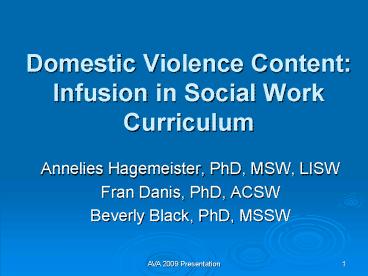Domestic Violence Content: Infusion in Social Work Curriculum PowerPoint PPT Presentation
1 / 15
Title: Domestic Violence Content: Infusion in Social Work Curriculum
1
Domestic Violence Content Infusion in Social
Work Curriculum
- Annelies Hagemeister, PhD, MSW, LISW
- Fran Danis, PhD, ACSW
- Beverly Black, PhD, MSSW
2
IPV/VAW Cross-cuts fields of Social Work
Practice
Child Welfare CPS
Child Family Services
School Social Work
Social Work Fields of Practice
Mental Health
Substance Abuse
Medical Social Work
Employee Assistance
Public Assistance
Disability Gerontology
3
Social Work Education Research Efforts
- National Social Worker Summit on Violence Against
Women (2000) - Council on Social Work Education
- Violence Against Women and their Children Track
- Breaking the Silence - Publication on Curriculum
Modules - Society for Social Work Research
- Journal of Social Work Education
- Special issue
4
Social Work VAW CentersConnections and Resources
- School of Social Work, University of Minnesota
- Minnesota Center Against Violence and Abuse
- Institute on Domestic Violence in the African
American Community - School of Social Work, Rutgers University
- Center on Violence Against Women Children
- School of Social Work, UT-Austin
- Institute on Domestic Violence and Sexual Assault
5
Social Work Curriculum Areas
- Professional Values and Ethics
- Human Behavior in Social Environment
- Social Welfare Policy
- Diversity Populations at-risk
- Direct Practice skills
- Research and Evaluation
- Field Education Practicum
6
Infusion of Domestic Violence Content Across the
Social Work Foundation Curriculum
Human Behavior the Social Environment Theories
of Abuse Family vs. Gender-Based Violence
Violence across the lifespan Prevalence,
Dynamics, Risk Factors Myths
Social Work Practice Universal Screening Risk
Assessment Intervention Safety Planning
Secondary Trauma Safety risks of couple
counseling family therapy
Social Welfare Policy Services International
policies Violence Against Women Act TANF
Family Violence Option Child Welfare Policies
Employment Housing Discrimination
Social Work Foundation Curriculum
Diversity Populations at Risk Issues
services related to age, race, ethnicity, sexual
orientation, immigration status, and disability
of victims perpetrators
Field Practicum Opportunity to practice
universal screening, assessment, and
intervention in field placements Safety plans
for students
Values Ethics Right to self-determination
Confidentiality Safety Mandatory reporting
issues Duty to warn
Research Evaluation Measurement issues Safety
for Human subjects Community Needs assessments
Effectiveness of Interventions
Developed by Fran Danis, PhD U Missouri Columbia
Developed by Fran Danis, Ph.D. University of
Missouri - Columbia
Developed by Fran Danis, Ph.D. University of
Missouri - Columbia
Developed by Fran Danis, Ph.D. University of
Missouri - Columbia
7
Infusion Integration
- Infusion Model
- Integrate DV/IPV content to foundation courses
- Elective Courses
- Both attracted undergrads/grads in Social Work
and other majors - Provides opportunity for cross-professional
discussion and understanding
8
Danis Infusion Model Evaluation
- Used Quasi-Experimental Design
- Non-equivalent Control Group
- All students received DV 101 guest lecture
- Intervention Group
- Select group received a 3-hour skills building
class on risk assessment in 2 out of 3 course
sections - Measured
- Practice Self-Efficacy pre and post intervention
9
Danis Findings
- Student Self-efficacy increased for all BSW
students - Both control and experimental
- Self-efficacy increased on 6 out of 11 items for
MSW students - Experimental group showed strongest increase in
self-efficacy for MSW students
10
Black Social Work-Nursing Joint Class
- Blended experience and knowledge of two
professions - Both victim/survivors and perpetrators are seen
by social workers and nurses in many settings - Effectiveness of work depends on understanding of
perspectives and roles
11
Black Course Content
- Readings from both social work and nursing
- Assignments varied at times for nursing and
social work students - Used case studies that students explored from
professional perspectives - Used cross-professional discussion groups
12
Black Feedback
- Students often focused on clarifying professional
identities, professional socialization, and roles - Nursing students maintained their focus would be
medical eager to call in SW - Social work students expressed impatience at
nursing students med focus - Response to class mixed
- Many valued hearing from other profession some
felt the differences were too great
13
Hagemeister SW DV
- Upper division social work students and others in
social and behavioral sciences, education, and
other areas - Covers domestic violence and its relationship to
levels of social work practice - Micro Direct practice
- Mezzo Organizations and service delivery
- Macro Social policy and social change
14
Hagemeister Responses
- Course helped to dispel common myths about
domestic violence - Students felt more confident in being able to
assess and assist victim/survivors - Students learned to recognize links between DV,
CM, CD, and MH issues - Understood connections between/among service
providers and other systems
15
Conclusion
- Over the past decade theres been a steady
increase in infusion of content on domestic and
sexual violence in curriculum - Has been supported by network stemming from
conferences and maintained with listserv - Supported by resource and research centers in
schools of SW - Supported by professional education organizations

